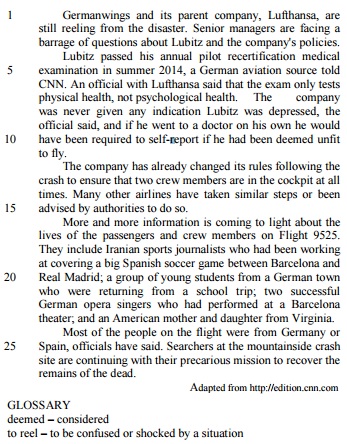Questões Militares Comentadas por alunos sobre vocabulário | vocabulary em inglês
Foram encontradas 434 questões
Resolva questões gratuitamente!
Junte-se a mais de 4 milhões de concurseiros!
DANCING EFFECTS ON THE HUMAN BODY

(Adapted from www.everydayhealth.com and www.livestrong.com)
Glossary:
health - “saúde"
ballroom dancing - “dança de salão"
to lose weight - “perder peso"
to improve - “melhorar"
calories burned – “calorias queimadas"
The Big Destructiveness Of The Tiny Bribe
Alexandra Wrage 03.01.2010
The smallest bribes can be the most vexing. Not suitcases full of money and transfers to offshore accounts, but the thousands of everyday payments people make to Indian building inspectors, Chinese customs officials and Nigerian airport functionaries, just to get things done. They’re payments for routine government services that a government official is legally obliged to perform but for which he’s hoping to skim off a little extra.
Unlike more serious bribes, these very modest payouts, formally known as “facilitating payments”, are not against the laws of the U.S., Canada, Australia, New Zealand or South Korea, when made abroad. They’re illegal for Great Britain, but the Serious Fraud Office there has taken the extraordinary public position that they’re unlikely to give rise to a prosecution.
Why don’t governments that lead the fight against large-scale bribery fall in line with what is already the practice of many major companies? They don’t want to outlaw such small-scale graft in foreign places, they say, because they don’t have the manpower to prosecute violators. By that logic, communities with just enough resources to handle murder and armed robbery would give a green light to shoplifting. You’d think a government could at least go after a few high-profile cases to set an example and a precedent. Permitting these smaller payments has to impede the effort to crack down on the larger ones. Companies know this.
“Facilitating” bribes are not tips. Tipping is voluntary, and you decide to do it after a service has been rendered. You don’t pay it at the outset to induce the waiter to bring the food, and you can always go somewhere else to eat next time should the service be bad. Nor are they welfare for underpaid civil servants. If government workers are underpaid, we should compensate them for the cost of customs inspections or airport security by aboveboard means, through taxation and so forth. Payment to individuals not only slows service but also encourages entrepreneurial civil servants to increase their income by creating more and greater obstacles.
Nor are they a mere distraction from the fight against bigger bribes. Rather, they fuel the problem. Junior officials who look for small bribes rise to higher positions by paying off those above them. Corruption creates pyramids of illegal payments flowing upward. Legalizing the base of the pyramid gives it a strong and lasting foundation.
Nor are these payments legal where they’re made. They may not be banned by the wealthy countries mentioned above, but they are outlawed in the countries where they’re actually a problem. Do developed countries want to say they wouldn’t tolerate such payments at home but don’t care if they’re made abroad? And since they’re illegal in the countries where they’re paid, companies can’t put them on their books. The classic cover for a bribe is to call it a “consulting fee”, but that is a books and records violation that is illegal in any country.
(www.forbes.com. Adaptado.)
Violence Prevention Among Young People in Brazil
Crime and violence have increased dramatically in Brazil in recent decades, particularly in large urban areas, leading to more intense public debate on causes and solutions. The right to life is the most fundamental of all rights. Having security means living without fearing the risk of violation of one’s life, liberty, physical integrity or property. Security means not only to be free from actual risks, but also to be able to enjoy the feeling of security. In this respect, human rights are systematically undermined by violence and insecurity.
UNESCO expects to play a primary role in supporting actions of social inclusion to help in the prevention of violence, especially among young people. The attributes and resources to be found in the heart of the Organization’s different areas will be grouped around this objective.
Violence is seen as a violation of fundamental human rights, as a threat to the respect for the principles of liberty and equality. An approach focused on the access to quality education, to decent jobs, to cultural, sports and leisure activities, to digital inclusion and the protection and promotion of human rights and of the environment will be implemented as a response to the challenge of preventing violence among youths. Such approach should also help in creating real opportunities for young people to improve their life conditions and develop their citizenship.
(www.unesco.org. Adaptado)
